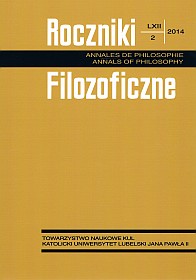Is “The Presumption of Atheism” in Fact a Neutral Procedure? A Critical Examination of Antony Flew’s Position
Abstrakt
Czy „domniemanie ateizmu” jest faktycznie neutralną procedurą? Krytyczna analiza stanowiska Anthony’ego Flew
Przedmiotem artykułu jest koncepcja „domniemania ateizmu” Antony’ego Flew. Flew twierdzi, że w punkcie wyjścia debaty na temat istnienia Boga powinniśmy przyjąć stanowisko ateizmu, a ciężar dowodu spoczywa na teiście. W artykule kwestionuję różne wymagania stawiane przez Flew reprezentantom teizmu i ateizmu. Odpowiadając na propozycję Flew, analizuję problem epistemologiczny, jak silne świadectwa na rzecz danego przekonania są potrzebne, by podmiot przyjął to przekonanie. Twierdzę, że zależne jest to od okoliczności, w jakich znajduje się dana osoba i jej indywidualnych uwarunkowań. Za pomocą tych analiz staram się wskazać, w jaki sposób różne osoby mogą racjonalnie wymagać od przekonania teistycznego innego stopnia prawdopodobieństwa niż od przekonania ateistycznego. Pokazuje to, jak sądzę, że propozycja Flew nie musi być racjonalna dla innych osób, choć może być taką dla samego Flew.
Bibliografia
Clifford, William Kingdon. “The Ethics of Belief.” In Lectures and Essays, edited by Leslie Stephen and Frederick Pollock, 177–211. London: Macmillan and Co., 1879.
Evans, Donald. “A Reply to Flew’s The Presumption of Atheism.” Canadian Journal of Philosophy 2 (1) (1972): 47–50.
Feldman, Richard, and Earl Conee. “Evidentialism.” Philosophical Studies 48 (1985): 15–34.
Flew, Anthony (with Roy Abraham Varghese). There is a God: How the World’s Most Notorious Atheist Changed His Mind. New York: HarperOne 2007 [Polish translation: Anthony Flew. Bóg istnieje. Wyznanie ateisty, trans. Robert Pucek. Warszawa: Wyd. Fronda, 2010].
Flew, Anthony. “The Presumption of Atheism.” Canadian Journal of Philosophy 2 (1) (1972): 29–46.
Flew, Anthony. “The Presumption of Atheism.” In A Companion to the Philosophy of Religion, edited by Philip L. Quinn and Charles Taliaferro, 410–416. Oxford: Blackwell Publishers Ltd., 1999.
Flew, Anthony. “The Presumption of Atheism.” In God, Freedom and Immortality: A Critical Analysis, 13–30. New York: Prometheus Books, 1984.
James, William. “The Will to Believe.” In The Will to Believe: And Other Essays in Popular Philosophy, 13–44. Portland: The Floating Press, 2010.
Moser, Paul K. The Elusive God: Reorienting Religious Epistemology. Cambridge: Cambridge University Press, 2009.
Pace, Michael. “The Epistemic Value of Moral Considerations: Justification, Moral Encroachment, and James’ ‘Will To Believe’.” Noûs 45 (2011): 239–268.
Plantinga, Alvin. “Reason and belief in God.” In Faith and Rationality: Reason and Belief in God, edited by Alvin Plantinga and Nicholas Wolterstorff, 16–93. Notre Dame: University of Notre Dame Press, 1983.
Plantinga, Alvin. Warranted Christian Belief. New York: Oxford University Press, 2000.
Schellenberg, John L. The Wisdom to Doubt: A Justification of Religious Skepticism. Ithaca: Cornell University Press, 2007.
Swinburne, Richard. Epistemic justification. Oxford: Oxford University Press, 2001.
Swinburne, Richard. Faith and Reason. 2 nd edition. Oxford: Oxford University Press, 2005.
Van Inwagen, Peter. “Is God an Unnecessary Hypothesis?” In God and the Ethics of Belief. New Essays in Philosophy of Religion, edited by Andrew Dole and Andrew Chignell, 131–149. New York: Cambridge University Press, 2005.
Copyright (c) 2014 Roczniki Filozoficzne

Utwór dostępny jest na licencji Creative Commons Uznanie autorstwa – Użycie niekomercyjne – Bez utworów zależnych 4.0 Międzynarodowe.





